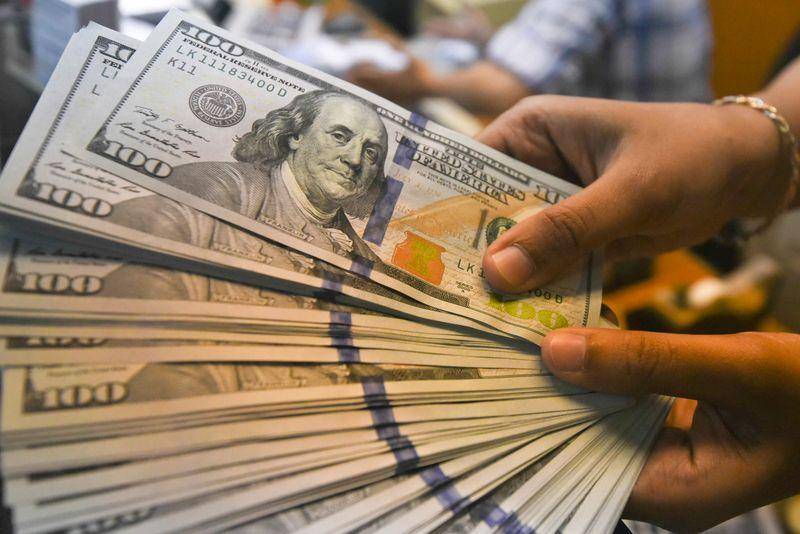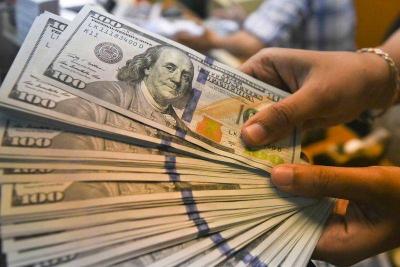The exchange rate of the US dollar in the black market in Lebanon has soared, surpassing the threshold of 140,000 Lira, recording 142,000 Lira for selling and 143,000 Lira for buying on Tuesday afternoon before later dropping to 118,000 Lira by the same evening. This enormous increase in the dollar's exchange rate has first affected fuel prices, followed by the prices of goods and food items. Amid this shocking rise in the dollar, citizens have also gone mad, with dozens of protestors blocking roads in various areas of Lebanon in protest against the unprecedented collapse of the national currency.
The phrase "the dollar has risen" has become just a repeating word in the ears of the Lebanese burdened with pressing life concerns, and calculators are no longer limited to educational purposes, as it has become commonplace to see citizens using their mobile phones to calculate the prices of goods priced in dollars according to the adopted exchange rate. With Lebanese stores beginning to price their goods and food items in US dollars, Lebanese people are asking themselves, what comes next? And who controls the black market?
The Ministry of Economy is struggling... The General Director of the Ministry of Economy and Trade, Mohammad Abu Haidar, stated to "Wardna" that the Consumer Protection Directorate is continuing its work despite the general strike, monitoring cost prices, selling prices, and profit margins. Abu Haidar confirmed that the ministry is working within its capabilities to monitor prices and issue violation reports against offenders.
However, based on experience, it appears that the ministry's measures remain insufficient to control the situation due to a lack of personnel in the Consumer Protection Department, which has been repeatedly reported by Minister of Economy Amin Salam.
Reasons for the Dollar's Crazy Rise: Lebanese banking and economic expert Nasseb Ghibril, in an interview with "Wardna," pointed to the complete paralysis of public and constitutional institutions and the disruption of Parliament's work as the main reasons behind the enormous rise in the dollar. In addition to the strike of the banks' association and the judges' withdrawal, all these factors, according to Ghibril, played a significant role in controlling the dollar's price.
Despite no increase in demand, consumption, imports, or wages, we are currently witnessing a massive rise in the dollar. Ghibril noted that "this confirms the control of speculators over the dollar's price." In this context, university professor and researcher in banking and financial laws, Sabine Kayek, confirmed to "Wardna," that the Central Bank of Lebanon is unable to intervene, pointing out the depletion of its reserve value that can be used in the market.
She highlighted that the insane rise in the dollar's price is a natural and logical matter, as the crisis has taken longer than expected, stressing that the ongoing political confusion and the disarray of the Central Bank suggest that we are heading towards worse outcomes. She added, "The dollar has no ceiling; the more the reserves of the Central Bank of Lebanon decline, the more the ceiling of the collapse of the national lira rises."
Lebanon is undergoing an economic crisis ranked as one of the three worst crises in the world since the mid-19th century, according to a detailed report by the World Bank over two years ago, titled "The Economic Monitor for Lebanon: The Great Denial." The great denial has been evident since the onset of the crisis in 2019 through the accelerating collapse of the national currency and the absence of prospects for resolving successive economic, political, and social crises, along with the incapacity of the political forces to elect a president or even implement the reforms demanded by the International Monetary Fund.
Amid this fragmented reality, Lebanese citizens are suffering under oppressive economic conditions, as their purchasing power has eroded, and they are seeking solutions outside their country, reflected in shocking figures regarding emigration, which the International Information Group estimates has increased by 150% compared to 2018.




